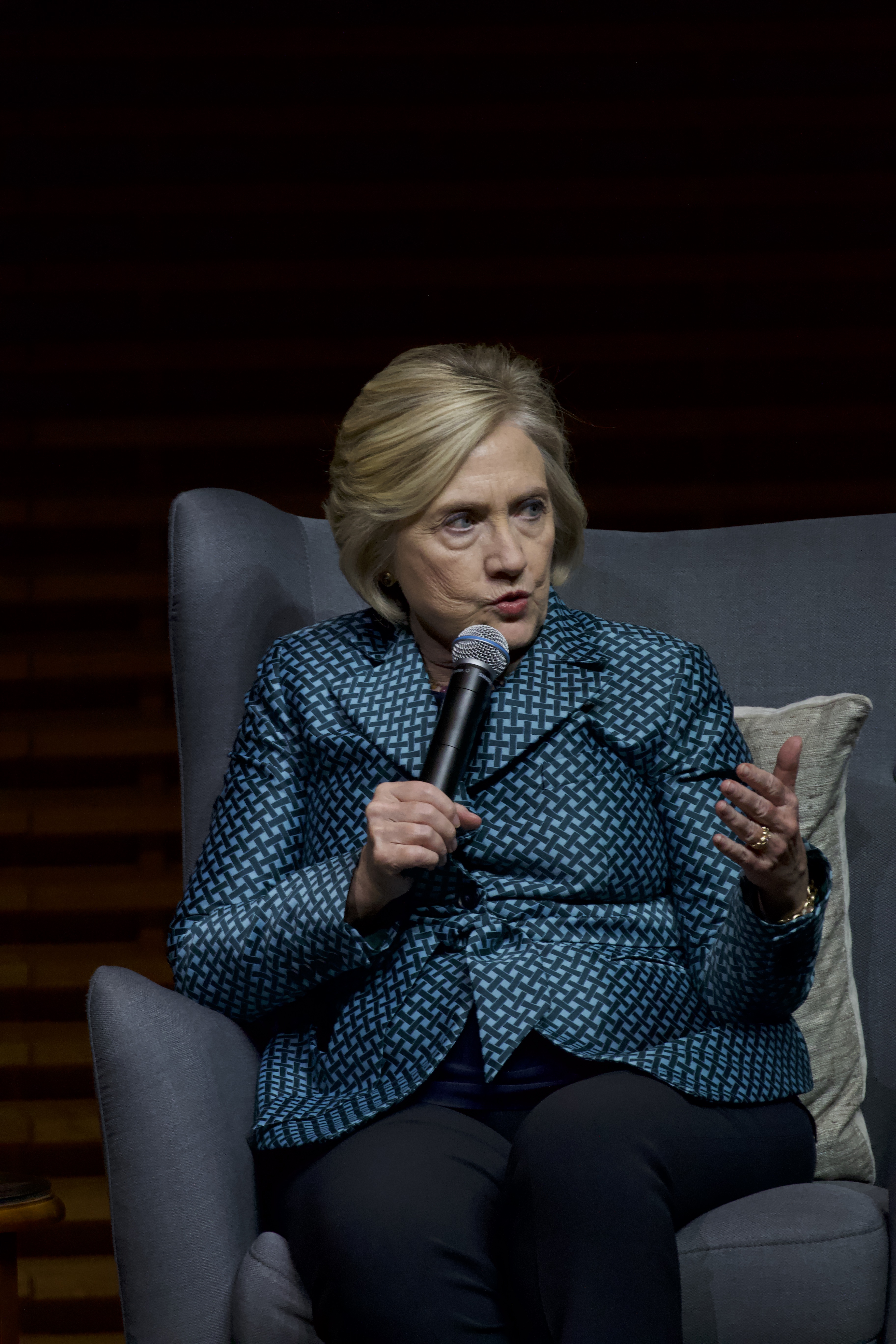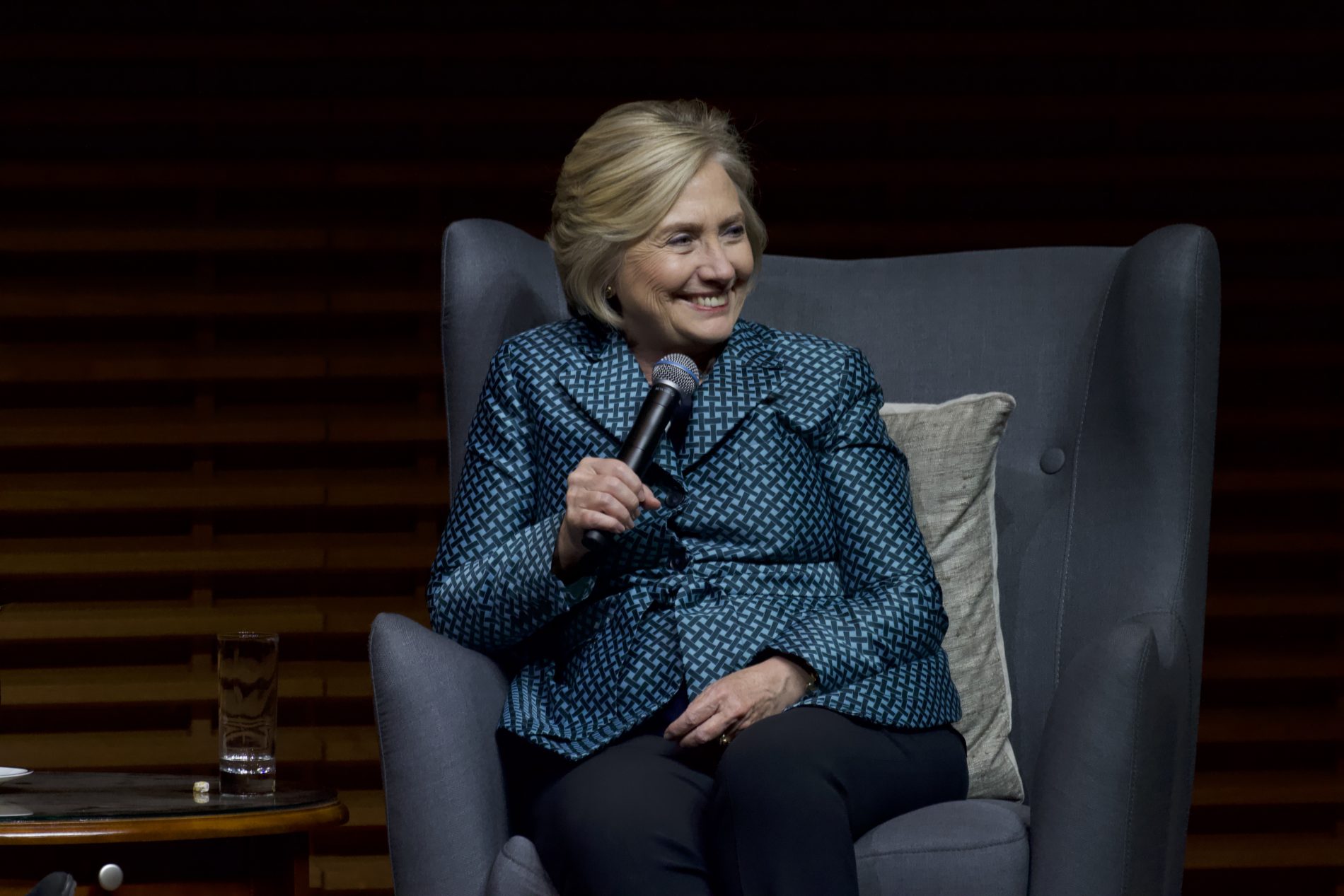Former Secretary of State and presidential candidate Hillary Clinton addressed an audience of over 500 at Stanford on Friday to discuss the critical — and at times difficult — relationship between technology and democracy.
Topics ranged from her loss in the 2016 presidential election to her initiatives as Secretary of State to her prescriptions for America’s future. Clinton expressed hopefulness about technology’s potential for good but also framed its misuse as an urgent threat.
“[Russia’s] weapon of choice is not tanks or missiles, but let’s not mince words,” Clinton said of the Russian government’s attempts to aid President Donald Trump’s election through the Internet and social media. “This is a new kind of Cold War. And it is just getting started.”
Clinton’s talk, entitled “Digital Technology, Diplomacy and Democratic Values,” was part of the day-long launch of the Global Digital Policy Incubator (GDPi), a project created by the Center on Democracy, Development and the Rule of Law (CDDRL) at Stanford’s Freeman Spogli Institute (FSI).
Larry Diamond, a senior fellow at FSI and a former director of CCDRL, gave opening remarks and touched on the other talks and workshops that had taken place earlier in the day as part of GDPi’s launch, explaining the importance of studying the problems the GDPi is intended to address.
“If there’s any conclusion that came out of our conference today… certainly one of the conclusions was this,” Diamond said. “If we do not identify — in this digital age — wise approaches to balancing democracy and free expression, both of these valued goals are going to suffer grievously.”
Clinton gave a prepared statement, then participated in a discussion with the Executive Director of GDPi, Eileen Donahoe JD ’88 MA ’89, who served as the first American ambassador to the United Nations Human Rights Council under President Barack Obama and worked for Clinton at the State Department. Toward the end of the event, Diamond asked Clinton a selection of questions from the audience.
A recurring topic of conversation was the presidential election.
“As we all know, the 2016 campaign revealed a darker side of the intersection between technology and democracy,” Clinton said, “with a brazen assault by a foreign adversary determined to mislead our people, inflame our divisions and throw an election to their preferred candidate.”
Clinton made clear how grave she considers Russia’s actions to be, referring to the hacking and publication of Democratic National Committee emails as a “virtual Watergate break-in.”
Clinton also talked specifically about the prevalence of “fake news” during the 2016 election cycle. She lay part of the blame for fake news on politicians, who she said have for years been creating “a very partisan environment…where the truth was perhaps made more elastic than it should have been.” But she also emphasized that America is facing a newer, more acute dilemma, where truth and facts have lost their power in American political culture.
“There has become an industry of fabrication for the purpose of gaining advantage: commercial advantage, partisan advantage, ideological advantage,” Clinton said. “And it has battered… our body politic.”
Clinton specifically referenced the false report spread on social media that claimed that she and John Podesta were running a child trafficking ring out of the basement of a pizza restaurant in Washington D.C. The fake story eventually led one man to bring a firearm to the restaurant in an attempt to rescue the alleged child slaves.
Clinton criticized the news media for failing to adequately challenge political falsehoods and investigate important stories such as the Wikileaks hacking of Podesta’s emails; she also castigated social media and technology companies. She argued that technology has “accelerated and made all pervasive” the spread of fake news.
“It’s time for Facebook to demonstrate real transparency and accountability,” Clinton said, adding that Twitter also needs to “to stop dragging its heels and face up to the reality that its platform was, and is, being used as a tool of cyber warfare and propaganda.”
In her prepared remarks, Clinton offered five recommendations for the future. First, she said, the U.S. government needs to focus on cyber security, particularly through developing public-private partnerships between corporate America and government agencies. Second, she said, the government needs to demonstrate toughness in response to Putin to force him to back down.
Third, Clinton recommended that America “close legal loopholes in our election process” that allow political advertisements on the Internet to go unregulated. Fourth, Clinton emphasized the importance of determining the full extent of interference in the 2016 election.

“Otherwise, we will not know exactly what needs to be done to halt this activity now and in the future,” Clinton explained.
For her fifth recommendation, Clinton said that Americans must “fight back against the assault on truth and reason and rebuild trust in our institutions.”
Clinton also discussed the past successes and future potential of technology in aiding the cause of democracy, citing myriad ways in which technology helped voters on Election Day in 2016. She also brought up the example of an app she helped spread as Secretary of State that allows dissidents living under authoritarian regimes to press a button on their phone that notifies friends and family that they are about to be arrested while simultaneously deleting all of the contact information on their phones.
On the whole, Clinton expressed a belief that the technology industry can fix the problems it helps to create.
“Silicon Valley has already shown that they can be — you can be — part of the solution when it comes to things like ridding the Internet of child pornography,” Clinton said. “We’re starting even to see progress in confronting online terrorist recruitment. Now companies like Facebook, Twitter and Google need to show the same commitment in addressing fake news and propaganda.”
Speaking specifically to the students in the audience, Clinton emphasized the importance of getting and staying involved in politics, no matter how disappointing the results of the last election might have been.
“I think common sense and shared experience eventually leads people to say, ‘hey, we’re not going to put up with this,” Clinton said, later adding that “for young people in particular, especially if it was your first presidential election, you can’t afford to be depressed, because really, the future is much more about you than it is about me.”
Despite the severity of the threats to the U.S. that Clinton described, she maintained that she is “fundamentally hopeful and optimistic.”
“Political action can change the political direction,” Clinton said. “And so if climate change is your issue, or guns are your issue, or immigration is your issue, or LGBT rights are your issue, or whatever it might be — decide you’re going to be active on those issues, and take that activism into the political arena, because we need you.”
Contact Sarah Wishingrad at swishing ‘at’ stanford.edu.
